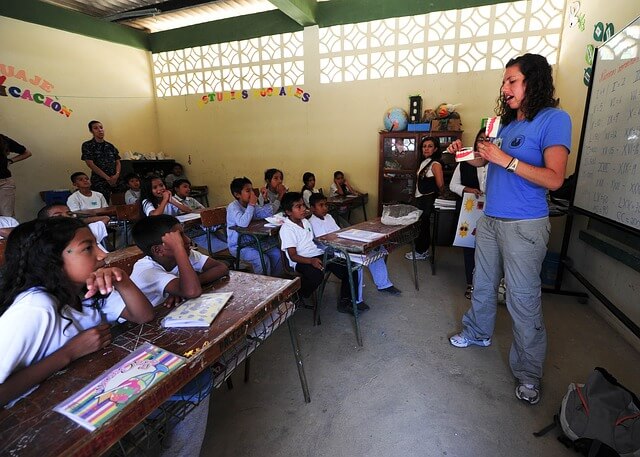A TEFL interview is intensive at the best of times with a cascade of grammar and vocabulary questions as well as questioning teaching philosophies and classroom management. This intensity is often dramatically increased with the request that part of the lesson will include a demo lesson (demonstration lesson).
What is a Demo Lesson?
What is a Demo Lesson?
A demo lesson in an interview is exactly what it sounds like – a short lesson in which you demonstrate your teaching methods whilst being observed. This article will take you to step by step through the whole process, from the preparation to the actual class – beginning to end, enabling you with the best possible opportunity to have the most wonderful class ever!
Demo lessons can take various forms. If you are applying from abroad then you may be asked to give a demonstration with the interviewer who will act out the role of an adult student. If in person, then you will typically be given a small group of students to work with.
The first thing to consider is the demo lesson content. It is essential to make a demo lesson plan, not only to share with the interviewer to show that you are dedicated and prepared but also to help you plan the demo lesson and have a written backup in case you suddenly lose your way midway through the demo lesson from nerves.
It is recommended that you try and use a plan format that has worked for you in the past – in this way not only have you practiced it, but it is also tried and tested. With all plans, it is essential to have progression – moving the demo lesson on from the starting point so that students are slowly developing and practicing their skills.
Your interviewer is looking for the following main aspects in your demo teaching
Knowledge of the subject matter – does the teacher know what they are talking about?
How the teacher shares the knowledge (teaches) – how does the teacher get the message across? – are they clear, do they break down the information into manageable steps? Do they check for understanding before moving on to the next section?
Relationship with the students – how does the teacher relate to the students? Do they take the time to listen to them or are they dismissive? Do they react appropriately to students? Is there differentiation with the teacher recognizing that some of the pupils are struggling or need more advanced work?
Classroom management – does the teacher have “teacher presence “? (I.e. an aura of authority and knowledge that they are in charge of the lesson) Do they give clear instructions as to what students should be doing? Do they give ample warning that a section of the lesson is coming to a close (e.g., five more minutes to work on this and then we will move onto … “)
Your interviewer is looking for the following main aspects in your demo teaching
Be engaging and confident during your demo lesson
In order to demonstrate that you have skills in all of these areas it is important to make sure that all aspects of your lesson are well thought out and that there is a progression in your demo lesson through having set parts of a lesson.
The introduction/explanation at the beginning of the demo lesson is very important – this is the time when you tell the students what they will learn about today and explain the main concept of the lesson e.g.”. Today’s lesson is about the past participle.” The way that you explain the main concept is up to you – however, all explanations need to start from the student’s current knowledge and slowly develop it.
Featured Job
During the main section of the demo lesson you want to demonstrate that you use a variety of techniques so be sure to carry out the kind of activities that you are most comfortable with. For example, perhaps you might include a whole class game to revise the main concept before breaking off into pairs to practice and reinforce the concept further. Alternatively, you may like to set pupils to work on a written activity with you working as the facilitator and going around the class, asking questions, and developing students’ knowledge further.
It is important to include a conclusion to the demo lesson – a section where you reinforce the concept that was learned today and give the interviewer a chance to reflect on whether the students have learned the concept you set out to teach. This can be through a fun activity game, quick-fire questions, total response games such as students moving to different parts of the room to answer the questions, etc.
As well as having a solid demo lesson plan that is progressive, it is important to also stand out as a teacher. You are wanting to demonstrate that you have thought about the demo lesson before the interview and that you are an interesting and interactive teacher. One way to do this is through using props – it is strongly suggested that you use props in your demo teaching. Bringing in props not only shows that you have thoroughly prepared for the demo teaching but also demonstrates that you are interested in the pace of the lesson and are an interactive teacher. These do not have to be something purchased especially for the demo lesson but can be homemade or something that you already had e.g. a large bag with items that you will show and use to emphasize the grammar or vocabulary point.
Be engaging and confident during your demo lesson
Throughout the class remember to smile – it is easy to forget to do this since you are worried about impressing the interviewer and are very aware that you are being watched, however, if it looks as if you are enjoying singing the song or explaining a grammar point then the interviewer will be more satisfied, feeling that you are happy in what you are doing.
Similarly, it is essential to look confident (even if you are not). Try to avoid hurried flustered actions or great indecision – if you do find your mind goes blank then simply carry on talking and change this as if it is part of the demo lesson. For example, explain that you will just check this very important point, (i.e. you will look at your demo lesson plan) and that it is always important to make notes as people don’t always remember everything. Remind the students to have an English notebook always by their side so that every time they hear a new word they can jot it down and look up the meaning later etc. In this way, you are turning a negative into a positive and the interviewer will see that you are adaptable.
You are wanting to demonstrate that you are an interesting and interactive teacher during your demo lesson
Use props and variety to make your demo teaching more interesting
A large part of your demo lesson will be judged on the way you look and move around the classroom. The interview will be looking to see how you interact with the students, how engaging you are when you are giving explanations, and how you capture the attention of the class whilst they are carrying out activities. As a result, it is important to make an effort not to simply stand in one spot but instead to move around, vary the pace of your speaking, and ensure that you are addressing a range of students and not just the eager person at the front, etc.
The interviewer will also be looking to make sure that you are technologically competent, so ask before the demo lesson what types of technology are available – interactive whiteboard, projector linked to a computer, etc. It is important not to overuse these as the interviewer wants to see you teaching not someone else in a video, however, through slipping in technology e.g. projecting a copy of a worksheet / using PowerPoint to supplement flashcards, etc., you are demonstrating your skills.
Overall, it is important to prepare well and think through the lesson before its delivery. You need to plan for all eventualities (such as the projector breaking down / the students not listening) and have specific strategies ready to deal with these. It does not matter if things do not go as planned, however, it is important that you keep on talking and do not simply stop – keep the lesson going in some shape. At the end of the day, not all demonstration lessons will be as perfect as you would have liked, however as long as the interviewer is still able to see your adaptability, flexibility, and true love of students, this will be overlooked and very soon the job will be yours!
Are you facing difficulties in finding and securing teaching positions in Vietnam? Are visa procedures causing you trouble? Feeling overwhelmed and directionless upon your arrival in Vietnam for teaching assignments? Don’t worry, VTJ’s English Teaching Placement in Vietnam (EPIV) Program 2024 provides comprehensive support to solve ALL the matters.
👉👉👉 Click HERE to request free consultation








